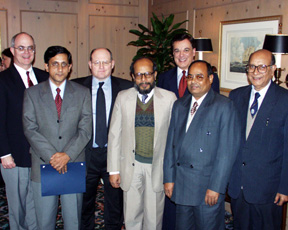 |
From left: Dr. James O. Armitage, Dean College of Medicine UNMC, Dr. Sikder M. Zakir, President-Telemedicine Reference Center, Ltd., Glenn Fosdick, President & CEO-NHS, M. Fazlur Rahman, Secretary-Ministry of Health and Family Welfare-Bangladesh, Nizar Mamdani, Executive Director-OIHS, Dr. Abul Hossain Sikder, Program Director-Local Initiative Programs-Bangladesh, Dr. M.R. Khan, National Professor of Bangladesh. |
On Oct. 31-Nov. 1, Nizar Mamdani, director of the NHS/UNMC Office of International Healthcare Services, hosted campus tours and a special dinner for Fazlur Rahman, M.D., Minister of Health and Family Welfare for Bangladesh, and his delegation, on Dr. Rahman’s first visit to Nebraska.
In addition to Dr. Rahman, the delegation included M.R. Khan, M.D., the senior physician in Bangladesh and founder of the largest children’s hospital in the nation; Zakir Sikder, M.D., director of the Telemedicine Reference Center, Ltd., and Abdul Hossain Sikder, M.D., director of the Local Initiative Program.
Bangladesh is the size of the state of Wisconsin, but has more than 132 million people, making it one of the world’s most densely populated nations. Surprisingly, Dr. Rahman said that, in Bangladesh’s case, this density is actually a good thing.
“Bangladesh has one of the biggest potentials to break loose from poverty than any other nation in the world,” Dr. Rahman said. “We are the largest population with the highest degree of homogeneity. Our entire nation speaks Bengalese. In fact more than 200 million people in the region speak Bengalese.
“Our people are hardworking and have extraordinary resilience, when one considers the recurring cyclones and floods that we endure,” he said. “Today, we are almost completely self-sufficient in rice and wheat. In addition, Bangladesh has set a standard for the use of model development banks in which groups of five women are extended credits as small as $100-$400 and they start independent business activities. Our people are finding numerous ways to succeed against poverty.”
Bangladesh is making good progress against infectious diseases and 70 percent of the population is inoculated. The United Nations Population Fund has rewarded the nation for its successful family planning programs. Primary education is compulsory and education is free for girls up to the 12th grade. Although 90 percent of the population is Islamic, Bangladesh is a very tolerant culture that has had female prime ministers for the last 10 years.
Dr. Rahman said that Bangladesh wants to develop an even more effective health system, to reduce productivity losses from debilitating diseases and save some of the $200 million Bangladesh citizens spend traveling overseas for more advanced medical care. He is particularly interested in NHS/UNMC’s advances in tele-medicine and medical management. Nebraska’s expertise in delivering rural medical services is badly needed in Bangladesh because so much of the population lives in hard to reach areas.
“I was very happy to learn of the collaboration agreement between Bangladesh and the Office of International Healthcare Services,” Dr. Rahman said. “We have much to learn from each other and I came to Omaha personally to express my support for this new venture.”
Among the guests at the dinner honoring the Bangladesh delegation were Glenn Fosdick, NHS president and CEO; James Armitage, M.D., dean of UNMC College of Medicine; Sam Cohen, M.D., Ph.D., UNMC professor of oncology, pathology, and microbiology; Ward Chambers, M.D., executive director of UNMC/NHS Community and Multicultural Affairs; John Gollan, M.D., chair of UNMC College of Medicine department of internal medicine administration; Ake Nystrom, M.D., UNMC associate professor in department of orthopaedic surgery; Tom Gouttierre, UNO dean of the department of International Studies; Carlos Montero, M.D., hematologist/oncologist from Panama who is in Omaha for six-month exchange program at the Lied Transplant Center; Al Wenstrand, Nebraska state director of economic development; Ron Ross, Nebraska state director of health and human services; Stan Garbacz, Nebraska state director of agriculture; and Mearlin Carlson, Nebraska state secretary of agriculture.